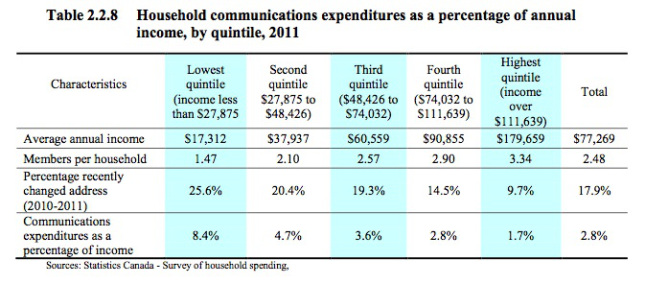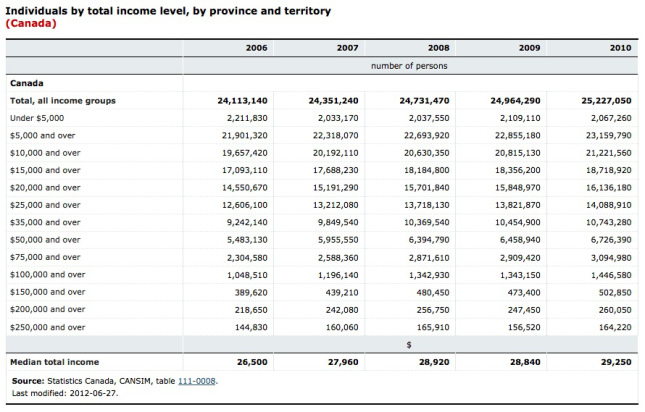 If you haven’t seen it yet, the CRTC’s annual Communications Monitoring Report is out and it’s full of exciting reading. From the percentage of English-speaking citizens listening to podcasts to the relative revenue growth of radio stations, the report has all the bases covered and should be on every Canadian’s required reading list.
If you haven’t seen it yet, the CRTC’s annual Communications Monitoring Report is out and it’s full of exciting reading. From the percentage of English-speaking citizens listening to podcasts to the relative revenue growth of radio stations, the report has all the bases covered and should be on every Canadian’s required reading list.
I’m being facetious, of course. The regulator’s annual findings are about as interesting to read for the average Canadian as the phone book itself (do they still print those?). Nevertheless, it is an important compendium of essential data that documents the state of the union, as far as telecommunications and broadcasting goes. It is required reading for industry wonks.
The one finding I thought was most interesting is the household expenditures on communications services, which includes TV, wireless, landline and internet, per income level.
It’s summarized on page 30 of the report and in the graphic below:
 As is obvious, the higher a household’s overall income, the less its inhabitants spend as a percentage on communications services. The richest Canadians spend just 1.7 per cent of their annual income on TV, wireless and so on, while the poorest spend nearly five times more of their relative income: 8.4 per cent.
As is obvious, the higher a household’s overall income, the less its inhabitants spend as a percentage on communications services. The richest Canadians spend just 1.7 per cent of their annual income on TV, wireless and so on, while the poorest spend nearly five times more of their relative income: 8.4 per cent.
How does that break down in terms of the population? Here’s a rough snapshot of who earns what, according to Statistics Canada:
 Comparing the two charts turns up some interesting results. If two Canadians earning the median income of $29,250 are counted to amount to a single household of $58,500, that places them in the third quintile of the above chart, where 3.6 per cent of income is going to communications services. That means they’re paying more than double of their relative income than the highest-earning Canadians.
Comparing the two charts turns up some interesting results. If two Canadians earning the median income of $29,250 are counted to amount to a single household of $58,500, that places them in the third quintile of the above chart, where 3.6 per cent of income is going to communications services. That means they’re paying more than double of their relative income than the highest-earning Canadians.
Over the course of the wireless war this past summer, there were a number of voices arguing - some obnoxiously so - that prices in Canada aren’t unduly high; that Canadians are in fact not paying too much. Many Canadians disagree; some subconsciously, some consciously. The above two charts do much to explain why.
How many of those people who claim that prices aren’t unduly high fall below that highest income quintile and therefore have an understanding of just how much of a bite telecom services are taking out of people’s monthly budgets? Among the highly paid executives, economists and industry consultants, is there even a one?

Marc Venot
October 1, 2013 at 12:47 am
At least Canada has the right regulation to not charge an annual fee on TV and the bless of using easily the rather good audiovisual production of the UK. For the French speaking side Radio-Canada has some tasty stuff, that are lacking in the English one like about sports.
Gary N
October 8, 2013 at 11:51 am
This above tells me nothing. What am I comparing it to. What do people in the UK, America, France, Germany, and others spend proportionally. Of course it will be higher percentage of income for the poor, but then so is gas, rent, food, and other costs or isn’t that obvious to you. What a waste of space this article is.
Peter Nowak
October 8, 2013 at 3:37 pm
You’ve missed the whole point, which is not that richer people spend less on telecom, but that they are the only ones who are saying prices aren’t high.
Gary N
October 8, 2013 at 8:40 pm
That still means nothing. Most poor will find the price of gas or food high. Most affluent will say the price of food and gas isn’t that high. Again, without comparisons your point is meaningless. Wireless and TV is like any other commodity. If you have limited income then you have a limited plan. If you can afford it then you will have a better plan. It’s no different than food. If you have a limited income then you aren’t spending money buying Filet and Lobster
Peter Nowak
October 8, 2013 at 9:33 pm
Gary N: I’m afraid I can’t explain it any more clearly, as you seem to be wilfully missing the point.
Gary N
October 8, 2013 at 9:34 pm
Ditto